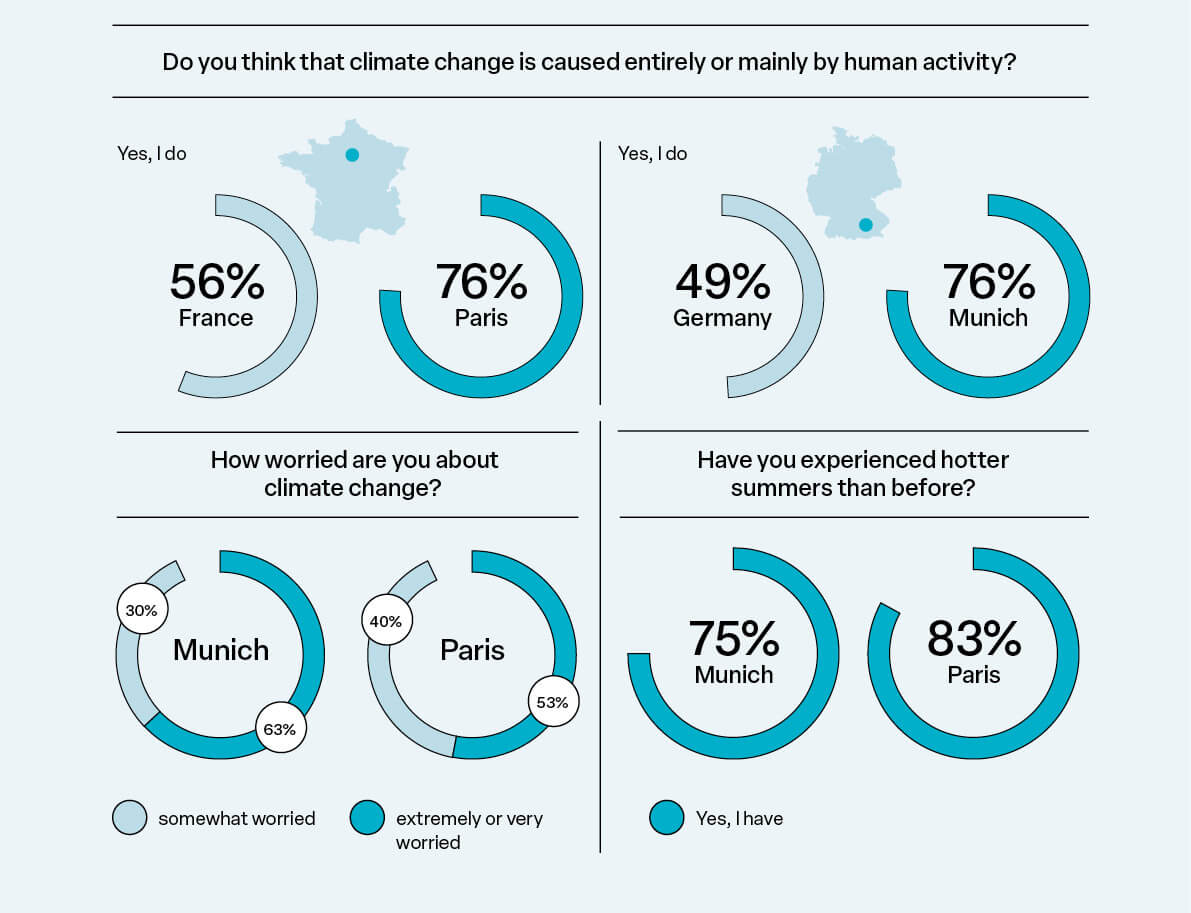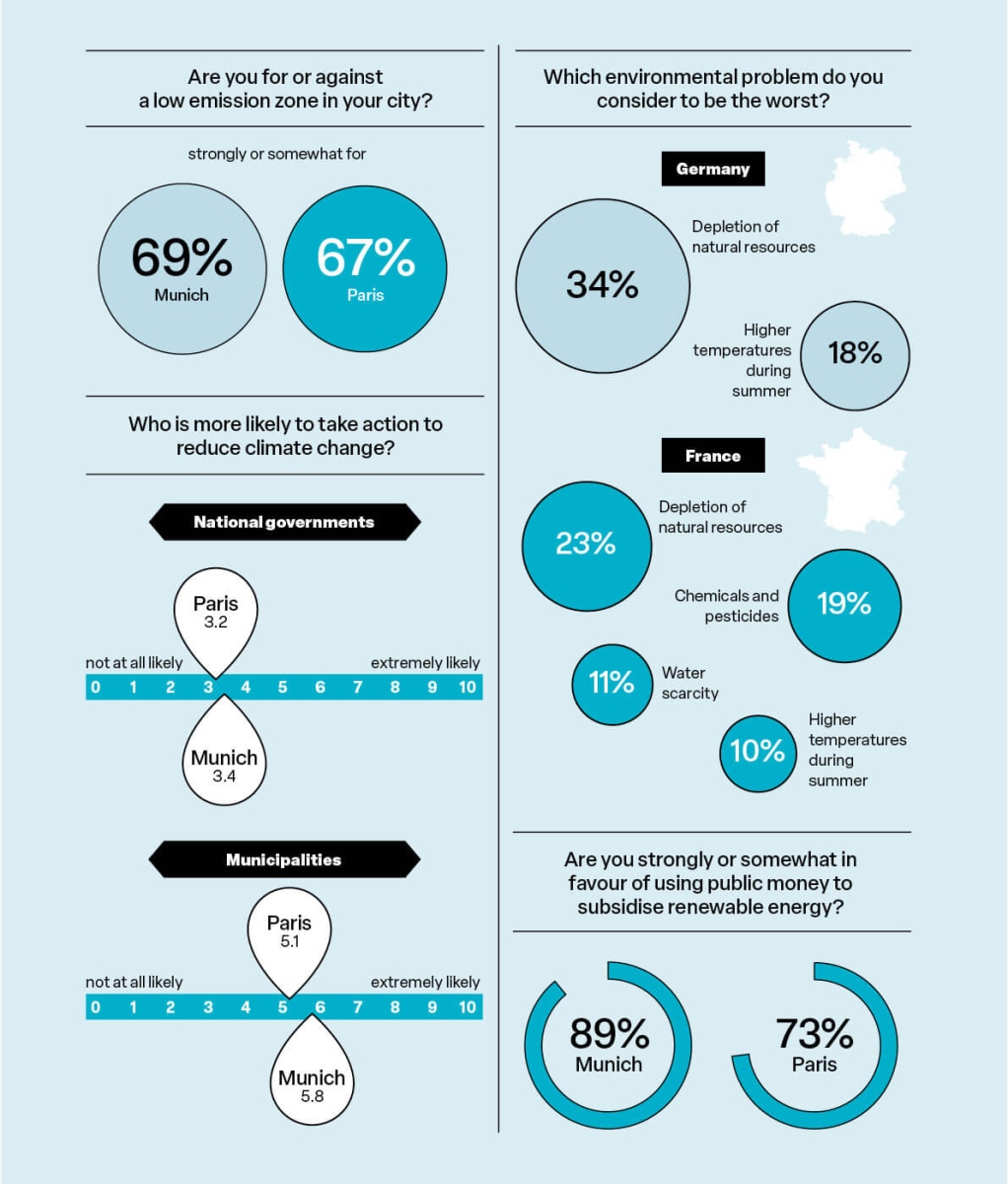
Inhabitants of Paris and Munich have more faith in local authorities than in national governments when it comes to climate action.
Key takeaways
- Analysis of people’s views on climate change. A recent study by the European Social Survey investigated residents’ views on climate change and their opinions on city policies.
- Residents trust local authorities to implement climate action. There is a bigger trust in municipalities than national governments.
- Public support is strong. A majority of city residents believe climate change is human-caused and support climate policies.
Cities are important players in mitigating climate change, so understanding the public’s perception and support for climate action is paramount for policymakers. A survey, conducted between 2023 and 2024 as part of the ICOS Cities project, shows that Paris and Munich residents put much more hope in their local authorities to mitigate climate change than they do in companies or their national government.
“The respondents seem to believe that local governments are the most likely to take action on climate change since many environmental public policies are implemented at the city or municipal level. The residents are also aware of how these policies affect their day-to-day lives and, therefore, hold more confidence in their municipalities when it comes to environmental action,” explains Dr Diana Zavala-Rojas, Deputy Director (External relations) at the European Social Survey European Research Infrastructure Consortium (ESS ERIC).
This should “encourage local policymakers to continue taking action against climate change and putting more ambitious policies in place,” she adds.
Higher temperatures bring climate change close to home
The survey shows that a striking 76% of Paris and Munich respondents believe climate change is caused by humans, a significantly higher number than the 49% national average for Germany and 56% for France. Agustin Blanco, Researcher at ESS ERIC, attributes this difference to an urban/rural divide in public opinion where city respondents tend to hold different values in comparison to rural residents.
The survey also shows an appetite for action from policymakers, says Dr Zavala-Rojas:
“Not only do a majority of respondents believe that climate change is caused by humans, but broad support also exists for environmental public policies aimed at limiting its impacts.”
This widespread consensus likely stems from increasingly palpable experiences, such as the intense heatwaves in 2019, 2022, and 2025, which saw temperatures soar above 40°C in many European cities. An overwhelming majority of respondents – 83% in Paris and 75% in Munich – reported experiencing higher summer temperatures, which underscores climate change’s direct and tangible impact on urban populations.
This public understanding and support provides fertile ground for ambitious climate action. Dr Zavala-Rojas believes the survey results can empower local climate actors to “show that most residents are ready to make efforts to minimise their environmental footprint”.
The survey shows that most residents are ready to make efforts to minimise their environmental footprint.
Dr Diana Zavala-Rojas - Deputy Director (External relations) at the European Social Survey European Research Infrastructure Consortium (ESS ERIC)
In fact, this is already taking place: In Munich, respondents indicated that they walk (46%) or cycle (37%) more for short journeys than they used to. Meanwhile, 40% say that they have reduced their household energy consumption.
Raising taxes reduces green policy support
Another takeaway from the research is that public support fades when green policy starts hitting people’s wallets.
This was seen in responses to questions regarding subsidies for renewable energy and electric car purchases, underscoring the sensitivity of public opinion to the economic costs of climate policies.
Public support for certain policies also varied between the two cities. More respondents in Munich use cars compared to those in Paris, which translated to slightly less support in the German city for policies like banning fossil fuel cars by 2030 and low emission zones.
“A majority of residents in both cities support increasing taxes on fossil fuels,” says Dr Zavala-Roja. This is more pronounced in Paris, especially in policies that could affect private cars, she adds.
Residents’ views on climate change and city climate policies
The ICOS Cities panel survey was conducted in Munich and Paris in 2023 and 2024 by the European Social Survey, to explore residents’ views on climate change and their opinions on city policies. The survey had more than 1,000 respondents in Munich and more than 700 in Paris.


